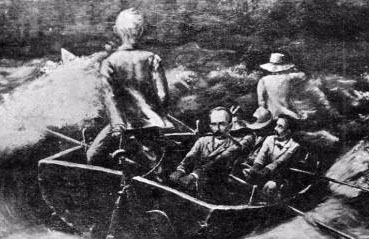
"I have two homelands, Cuba and the night, or are they both one?" wrote Jose Marti in his simple verses, and it was in the night and the storm of April 11, 1895 when he arrived in his homeland, by Playita de Cajobabo, in order to join the Necessary War that he organized from exile to liberate it from colonialism.
He was accompanied by General Máximo Gómez, General in Chief of the Liberation Army, protagonist of the next shout of independence on February 24 of that year, given from the East and other enclaves of the country, in compliance with the order of uprising issued by Marti as Delegate of the Cuban Revolutionary Party, and after the signing of the Proclamation of the Manifesto of Montecristi agreed by both a few days before.
That disembarkation, whose final stretch was made in a boat battered by the waves, the winds and the rain, meant for the Master a supreme happiness, contrary to what could be thought, because he was returning as he had dreamed. To fight for independence.
He had seen her somehow, from the poem quoted above, as a sad widow with a carnation in her hand and he knew the meaning of the flower.
Of the joyful feeling of finally stepping on his Cuban land, the notes in his Diario de Campaña (Campaign Diary), a historical document revealed to be a pleasant and at the same time instructive reading, attest to this.
For the Apostle, as he wrote convinced to a friend, the time had come to be consistent with the honor and everything he had preached, therefore it was unthinkable any other option that would lead him not to participate directly in the fighting.
From his exile in the United States and in his political pilgrimage through Latin American countries, he worked intensely for the independence cause for about 15 years, with broken health and in the midst of hardships.
The times of his greatest experience in the preparations for the war began in the 90's and this became visible with the founding of the Cuban Revolutionary Party, ideological rector of the war and the newspaper Patria in 1892.
Both served him as powerful tools to organize the last liberation struggle, working all the time for the unity of all his compatriots who supported the liberation, inside and outside Cuba, and to combat the annexationist ideas and other weaknesses that ruined the first insurrectional campaign (1868-1878).
Marti also conceived the project of making this a new nation that would fulfill the ideal of justice: "With all and for the good of all" and at the same time contribute with the independence to prevent foreign hegemonistic desires.
He studied conscientiously since his youth the weaknesses and strengths of the initial struggle and other fleeting stages aimed at emancipation and did not want to repeat the defects that undermined those processes, which led to the frustration of their objectives.
His work then was not only mobilizing and focused on logistics and armaments, which he accomplished; it was also political and ideological, with an unseen comprehensiveness and fulfilled in a clandestine manner, with a confrontation on foreign soil to the persecution of police and secret agents paid by Spain.
He emphasized that the war should not be an action dominated by anger, but a brief and effective process to win the universal rights corresponding to a free and sovereign people.
Before the arrival of Marti and Gomez, another important event took place with the arrival of Lieutenant General Antonio Maceo and Generals Flor Crombet and Jose Maceo on April 1st, who disembarked on the beach near Duaba, south of Oriente, on the schooner Honor, to honor their commitments to Marti and Cuba.
Shortly after, Gomez, in his initial speech to the troops, said: "Soldier! We will go to the farthest reaches of the west, to where there is Spanish land, there will be the Cuban Ayacucho".
After Martí's disembarkation, the assembled military command granted him the position of major general of the Liberating Army. Some members of the troops already conceived him with the future position of president of the Free Cuba for which he was fighting and so they questioned him.
He always made it clear that he preferred the term Delegate for his name. Nobody imagined that he would fall in his first combat on May 19, 1895.
But Jose Marti knew the risks, and assumed them with courage and honor, of which he gave written testimony in his unfinished letter to his Mexican friend Manuel Mercado, as well as with his actions. He fell facing the sun, as he also evoked in another poem of his simple verses.
Sidebar

 Agencia Cubana de Noticias
Líder en información nacional
Agencia Cubana de Noticias
Líder en información nacional








Nos reservamos el derecho de no publicar los comentario que incumplan con las normas de este sitio